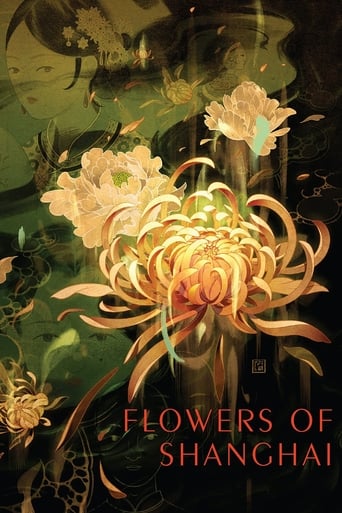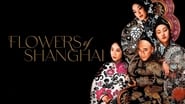GertrudeStern
I came to this movie because Mark Lee Ping Bin did the cinematography, and I was not let down. For a movie that never leaves the four walls of various brothels throughout Shanghai, each scene really fills up the screen, has irresistible colors and lighting and splendor, only to fade softly into black and light up into something new. Imagine how delighted I was to find that the cinematography was matched by an equally strong concept, and that the film is basically a series of vitriolic or pining Craigstlist missed connections ads nestled within an intricate and iron-clad social hierarchy.A fun touch: in the first conversation of the film, one master tells a tale over dinner, sitting around the table with his friends and their companions. It is the story of Crystal (whose outcome will be revealed later in the film) and her lover, a young patron named Yufu. The speaker says that Crystal and Yufu are joined together like toffee, star-crossed lovers who can't get enough of each other. Soon, a debate breaks out: is this type of love a healthy way to live? A few men balk at the idea that growing gaunt from staring into one another's eyes is acceptable. Then the film drags us through countless loveless or otherwise fraught relationships where everyone is withering, suicidal or raging. Seems that in 19th century Shanghai, you just can't win.Watch out for Master Wang...he's the pesky stray thread that undoes the whole damned sweater.
Red-125
The film Hai shang hua was shown in the U.S. with the title Flowers of Shanghai (1998). It was directed by Hsiao-Hsien Hou.This movie is a Japanese film, but the dialog is in Cantonese, Mandarin, and the Wu language of Shanghai. (Although I haven't seen any confirmation of this, it looked to me as if some of the dialog was dubbed. Possibly the actors were speaking Japanese, but were dubbed into Chinese.)This is a meticulous, careful film about houses of prostitution in Shanghai in 1884. Four houses are represented, but I have to admit that it wasn't always clear to me in which house the action was taking place. These houses, called "Flower Houses," were only for the very wealthy and powerful. The furnishings were elegant, there were servants everywhere, and the women were very beautiful. Unlike what we outsiders know about geishas, these women didn't appear to be skilled in musical instruments or singing. Everyone understands that they perform their professional duties in the bedrooms. However, the houses are used for parties and drinking, with the women present as hostesses and onlookers. (Incidentally, in a film about prostitutes, there's absolutely no visible flesh--all the women are fully. and elegantly. clothed at all times.)The social hierarchy of both the "flowers" and their clients is carefully delineated and known to all. The "Aunties" rule the houses, but the women themselves have a carefully defined status. They are more like indentured servants than slaves, even though they have been purchased from their parents at a young age. Some of the women have their own servants, and the houses are full of cooks and waitresses.This film was shot completely indoors, in sets, in Japan. There's not a single scene shot outside one of the houses. People talk about going for a ride in the park, or for an evening at the opera, but we never see anyone actually do this. Instead, we have a complex indoor social world, with feuds, ambitions, betrayals, and greedy acts all taking place before us. Hou Hsiao-hsien is known for his long takes, and his slow dissolves. Typically, his camera doesn't move at all, although in this film it moves, but only slowly and carefully. This is a film that I highly recommend, although I admit that I wasn't always certain about the specifics of the plots. As I read the IMDb synopsis, I realized that I had missed some key elements. However, I still enjoyed the movie, and it will work--as it did for me--even if you can't always remember which flower is Jasmin and which is Jade.We saw this film as part of a Hou Hsiao-hsien retrospective at the wonderful Dryden Theatre at George Eastman House in Rochester. It will work on DVD, but it you get a chance to see it in a theater, go for it. It's interesting, powerful, and opens up a whole new world.
psteier
Done in a very formal and elliptic style, with long shots from a single camera and without crosscutting. All the scenes are in rooms of a few Flower Houses (where the women live and sometimes meet their customers) and in a tea house, where the customers eat and drink and call in Flower Girls for entertainment and company.What action there is centers around the women trying to keep their customers coming, to marry the customer (the preferred way out of the business), or to attract the customers from other women. A bit of economics is thrown in for good measure.I could not get interested in the plot or the characters. Though the costumes and sets are well done, they are not worth two hours.
c42105
At the end of the 19th century, Chinese officials used to spend their leisure time in lush brothels in the British concession of Shanghai. Hou Hsiao-Hsien's 'Hai Shang Hua' depicts the intricate social network sustained in those premises by the customers, the girls (called flowers) and the Madams. The personal relations in those brothels were ruled by pleasure, money, love and social status in a perfect parallel to the 'outside' society, which, in turn, is perceived throughout the film almost as unreal. Hou is a master creating ambiences: the film transmits an extraordinarily subtle feeling of warmth and suffocation fostered by a miraculous music. With neither a beginning nor an end, this superb film is not apt for those looking for adventures and easy-to-tell stories.




